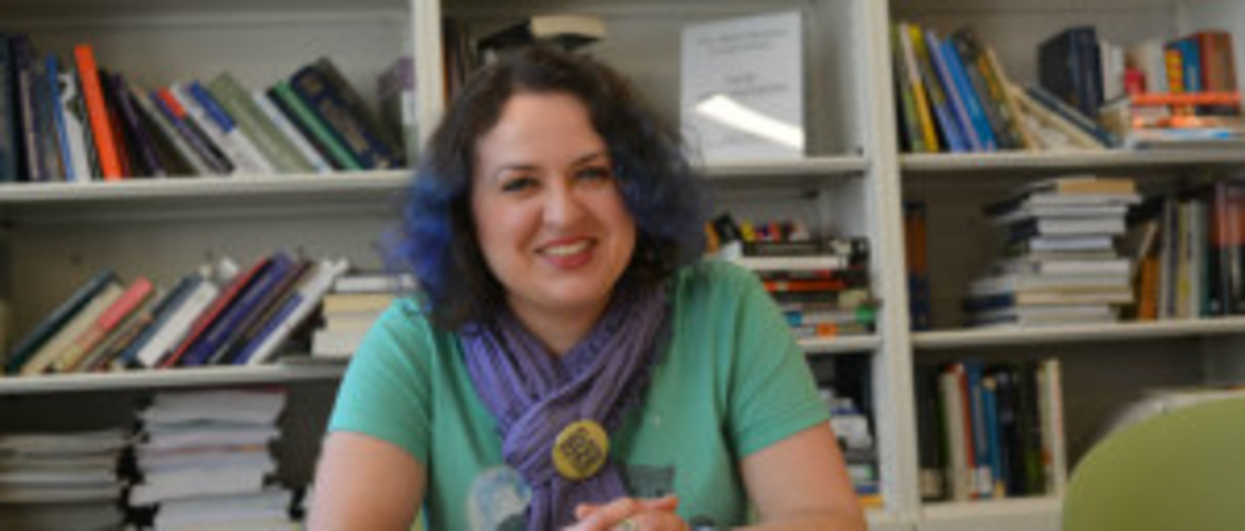Meet Andrea Horbinski

Perhaps nowhere are comics more influential than in Japan, where manga has long been a cultural touchstone and inspired a worldwide fan following. But for such a popular medium, histories of the form are surprisingly contradictory and scarce. A few claim manga is a thousand year old Japanese tradition, with many others maintaining manga first appeared only after World War II. New Media Designated Emphasis and History Ph.D. candidate Andrea Horbinski is setting them all straight. Her research argues that manga is best understood as a form of sequential art, which, while created in Japan in the early 20th century, was greatly influenced by cinema and comics from abroad, as well as by indigenous artistic predecessors.
From a young age, Andrea was drawn to fantasy and science fiction. When she graduated from middle school, she even dedicated her speech to her love of the hit movies Star Wars. This passion for speculation and other worlds inspired her interest in history and led her to a Classics and Asian Studies degree at St. Olaf’s University in Minnesota, where she compared the models of Roman and Chinese empires. It is no surprise then that as she increasingly focused on Japanese history and its language — attending Kyoto University on a 2007-2008 Fulbright scholarship — she was drawn to manga.
Manga ranges from children’s entertainment to serious political criticisms and explorations of socially controversial topics. The medium has come under intense criticism as a result, with many arguments against manga readership in the 1930s and 1940s echoed in American discussions of the 1950s, but with different effects. In the 2010s, Fredric Wertham-style denunciations of manga as harmful to child development and encouraging of immoral behavior have been lodged, particularly against female readers of certain genres. Manga then serves as one visible example of greater societal tensions over changing morality, social customs, and the place of women in modern, globalized Japan. Given the importance of the medium as such a site of cultural reflection, manga’s murky history proves problematic. How can we begin to unravel its influence without understanding its origin, format, and global engagement.
Andrea has spent the past year in the archives of Tokyo, Kansai, and Osaka researching her dissertation “Manga’s Global Century,” which looks at the history of manga from approximately 1905-2012. Many historians, she suggests, make the mistake of foreshortening manga’s history to the post-World War II era, thereby occluding the comics’ transnational origins. Andrea’s timeline allows her to compare manga to American comics and Franco-Belgian bandes dessinées at key moments, thus enabling an evaluation of local conditions in Japan and an understanding of how different factors in each country produced such vastly different outcomes and developmental trajectories. Precisely charting manga’s history, Andrea is able to place the medium in the global history of modernity and comics, permitting deeper and more nuanced analysis of the form itself.
In part, Andrea thanks the BCNM for this deeper exploration of manga she is now afforded. Andrea has extensively collaborated with Professor of Theater, Dance, and Performance Studies Abigail De Kosnik on Fan Data/Net Difference, a research group studying online-based fandom content production using web scraping tools to amass quantitative data. The conceptual tools she gained through this partnership have provided her with a framework for the study in which she is now engaged. This experience has in fact been so fruitful, she continues to work with Gail De Kosnik on another project, aimed at transforming oral history data into a book.
Andrea’s keen interest in science fiction, fantasy, and comic fandom, along with historical preservation, has led her not just into a host of international archives. Her passion for these subjects has prompted her to shoulder a public role as a spokesman and caretaker for such understudied works. She therefore serves on the board of the Organization for Transformative Works (OTW), an international non-profit that seeks to archive and record artifacts and events in fan culture, while providing a space for discussion of fandom related meta topics, including media coverage and legal challenges to fan-created production.
Perhaps then even more impressive than clarifying manga’s contentious history, is Andrea’s ability to navigate an academic and public service life. Not everyone can balance such varied and competing responsibilities. Andrea, however, has so well dovetailed her expertise in these subjects, she makes managing the roles of research and advocacy appear elegant.
Support our students challenging conventional wisdom by donating today!
